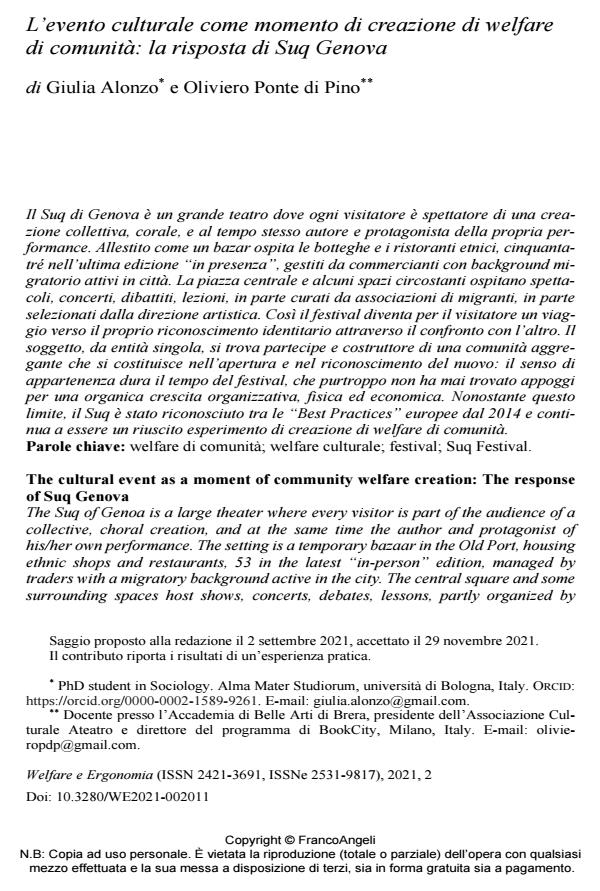The cultural event as a moment of community welfare creation: The response of Suq Genova
Journal title WELFARE E ERGONOMIA
Author/s Giulia Alonzo, Oliviero Ponte di Pino
Publishing Year 2022 Issue 2021/2
Language Italian Pages 10 P. 147-156 File size 177 KB
DOI 10.3280/WE2021-002011
DOI is like a bar code for intellectual property: to have more infomation
click here
Below, you can see the article first page
If you want to buy this article in PDF format, you can do it, following the instructions to buy download credits

FrancoAngeli is member of Publishers International Linking Association, Inc (PILA), a not-for-profit association which run the CrossRef service enabling links to and from online scholarly content.
The Suq of Genoa is a large theater where every visitor is part of the audience of a collective, choral creation, and at the same time the author and protagonist of his/her own performance. The setting is a temporary bazaar in the Old Port, housing ethnic shops and restaurants, 53 in the latest "in-person" edition, managed by traders with a migratory background active in the city. The central square and some surrounding spaces host shows, concerts, debates, lessons, partly organized by migrant associations, partly selected by the artistic direction. For the visitor, the festival becomes a journey towards his/her own identity recognition, through the comparison with the Other. The visitor of the Suq, as an individual, is part of the aggregating community that he is building with his/her own presence, in the openness and recognition of the new: the feeling of belonging lasts the time of the festival, which unfortunately has never found the economic support necessary for an organic organizational growth, with a greater venue and/or a longer duration. Despite this limitation, the Suq has been recognized as a European Best Practice since 2014 and continues to be a successful experiment in creating community welfare.
Keywords: Community Welfare; Cultural Welfare; Festival; Suq Festival.
- Cavalli A. (2018). Al SUQ. Una Città, 248: 16-19.
- De Biase F. (2020). Rimediare Ri-mediare. Saperi, tecnologie, culture, comunità, persone. Milano: FrancoAngeli.
- Alonzo G. (2019). Odori, incroci, donne al Suq di Genova. -- Testo disponibile al sito: https://www.doppiozero.com/materiali/odori-incroci-donne-al-suq-di-genova (ultimo accesso il 26 agosto 2021).
- Argano L. (2021). Guida alla progettazione della città culturale. Milano: FrancoAngeli.
- Bernardi C. (2004). Il teatro sociale. L’arte tra disagio e cura. Roma: Carocci.
- Carpani R. e Innocenti Malini G. (2019). Playing inclusion. The performing arts in the time of migrations. Comunicazioni Sociali, 1.
- De Certeau M. (1980). L’Invention du Quotidien. Arts de Faire, Union Générale d’éditions (trad. it.: L’invenzione del quotidiano. Roma: Edizioni Lavoro, 1990).
- De Marinis M. (2011). Il teatro dell’altro. Interculturalismo nella scena contemporanea. Firenze: La Casa Usher.
- Dell’Avanzato S. (2012). Il welfare «dal basso verso l’alto»: la Carta di responsabilità sociale europea. Quaderni di Sociologia, 59: 149-165.
- Cicerchia A. (2021). Che cosa muove la cultura. Impatti, misure e racconti tra economia e immaginario. Milano: Editrice Bibliografica.
- European Agenda for Culture (2014). Report: The Role of Public Arts and Cultural Institutions in the promotion of Cultural Diversity and Intercultural Dialogue. -- Testo disponibile al sitp: https://ec.europa.eu/assets/eac/culture/library/reports/201405-omc-diversity-dialogue_en.pdf (ultimo accesso il 26 agosto 2021).
- Fuoco E. (2020). Il teatro del mondo. Per un’estetica relazionale: SUQ Festival. Antropologia e teatro, 12: 84-104.
- Manzoli G. e Paltrinieri R., a cura di (2021). Welfare Culturale. La dimensione della cultura nei processi di Welfare di Comunità. Milano: FrancoAngeli.
- Ponte di Pino O. (2021). Un teatro per il XXI secolo. Lo spettacolo dal vivo ai tempi del digitale. Milano: FrancoAngeli.
- Rago S. e Venturi P. (2016). Imprese sociali e welfare di comunità, 10, AICCON.
- Taffon P. (2009). La festa «nuova» nella città multiculturale. In: Carli M.C., Di Cristofano Longo G. e Fusco I., a cura di, Identità mediterranea ed Europa. Mobilità, migrazioni, relazioni interculturali. Roma: CNR.
- Turner V. (1982). From Ritual to Theatre. The Human Seriousness of Play. Baltimore: Paj Publication; Bologna: il Mulino (trad. it.: Dal rito al teatro. Bologna: il Mulino, 1986).
- Zamagni S., Venturi P. e Rago S. (2015): Valutare l’impatto sociale. La questione della misurazione nelle imprese sociali. Impresa Sociale, 6: 77-97.
- Festivals as instruments of cultural welfare: A theoretical reflection Giulia Alonzo, Giulia Rossetti, in WELFARE E ERGONOMIA 1/2023 pp.25
DOI: 10.3280/WE2023-001003
Giulia Alonzo, Oliviero Ponte di Pino, L’evento culturale come momento di creazione di welfare di comunità: la risposta di Suq Genova in "WELFARE E ERGONOMIA" 2/2021, pp 147-156, DOI: 10.3280/WE2021-002011